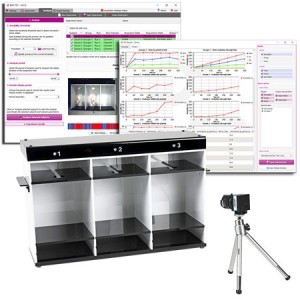Authors
DW Lim, T Han, MY Um, M Yoon, TE Kim, YT Kim et al
Lab
Research Division of Functional Food Functionality, Korea Food Research Institute, Wanju 55365, Korea
Journal
Nutrients
Abstract
Geum japonicum, commonly known as Asian herb bennet, has been used as a diuretic, astringent, anti-dizziness, and anti-headache agent in traditional medicine. Since the antidepressant like effects of G. japonicum extract have not been well studied, we examined the antidepressant-like effects of G. japonicum extract using depressive-like behavior induced in mice through daily injection of corticosterone (CORT). ICR mice (male, 8 weeks old) were treated with CORT (40 mg/kg, i.p.) and orally administered using oral gavage needles with G. japonicum extract (30, 100, and 300 mg/kg) for 4 weeks. Behavioral experiments were performed 1 h after administration. The control mice exhibited a significant increase in the immobility times in the tail suspension and forced swim tests as well as the step-through latency time in the passive avoidance test. Further, the control group showed a significant decrease in their sucrose consumption. However, treatment with G. japonicum extract at doses of 100 and 300 mg/kg significantly improved these depression-like behaviors without altering the locomotor activity. Moreover, treatment with G. japonicum extract significantly prevented the decrease in the expression of brain-derived neurotrophic factor (BDNF) in the hippocampus. In addition, G. japonicum extract had neuroprotective effects against CORT-induced neurotoxicity in SH-SY5Y cells. Our study indicates that G. japonicum extract exhibits antidepressant-like activity in CORT-induced depressive mice, which might be as a result of increased BDNF expression.
BIOSEB Instruments Used
Tail Suspension Test - Wireless (BIO-TST5)
Keywords/Topics
Depression; Mood disorders
Source :

 Pain - Thermal Allodynia / Hyperalgesia
Pain - Thermal Allodynia / Hyperalgesia Pain - Spontaneous Pain - Postural Deficit
Pain - Spontaneous Pain - Postural Deficit Pain - Mechanical Allodynia / Hyperalgesia
Pain - Mechanical Allodynia / Hyperalgesia Learning/Memory - Attention - Addiction
Learning/Memory - Attention - Addiction Physiology & Respiratory Research
Physiology & Respiratory Research











![Dynamic Weight Bearing 2.0 – Postural Module [Add-on]](https://bioseb.com/733-home_default/dynamic-weight-bearing-20-add-on-postural-module.jpg)
























 Pain
Pain Central Nervous System (CNS)
Central Nervous System (CNS) Neurodegeneration
Neurodegeneration Sensory system
Sensory system Motor control
Motor control Mood Disorders
Mood Disorders Other disorders
Other disorders Muscular system
Muscular system Joints
Joints Metabolism
Metabolism Cross-disciplinary subjects
Cross-disciplinary subjects CONFERENCES & MEETINGS
CONFERENCES & MEETINGS 